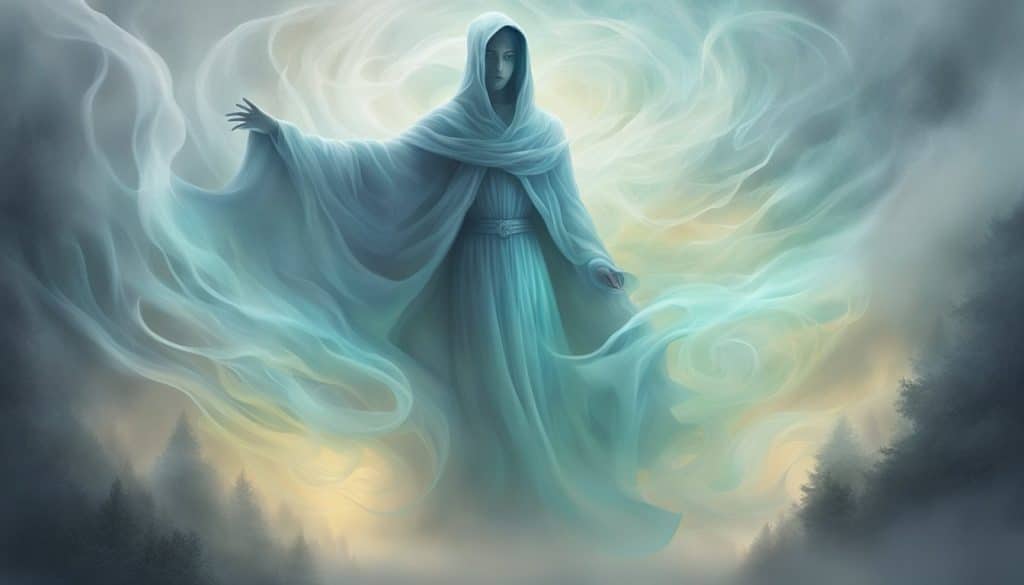Dreams featuring ghostly encounters can be haunting and often leave a deep impression upon waking. Whether you consider them mere fragments of imagination or messages from beyond, these visitations evoke a strong emotional response. The science of dream interpretation hinges on an understanding of the subconscious mind, which actively constructs complex dreamscapes as a reflection of our innermost thoughts and feelings.
Table of Contents
Toggle
Dissecting these visions can reveal important clues about your psychological state. They can symbolize unresolved issues, hidden fears, or aspects of your personality you have yet to confront. Taking a closer look at encounters with apparitions in dreams opens up a pathway to better understand the subconscious influences on your waking life, as well as the cultural and personal significance these spectral images may carry.
Key Takeaways
- Ghostly encounters in dreams are a window into the subconscious, reflecting inner thoughts and emotions.
- These dreams can be interpreted to gain insights into personal psychological states and unresolved issues.
- Understanding cultural and religious contexts enhances the analysis and navigation of ghostly dream experiences.
Psychological Meaning of Ghost Dreams

When you dream of ghosts, it’s often more than just a spooky encounter; these visions tap into the depths of your subconscious. They carry the weight of your inner emotions and undisclosed feelings, inviting you to explore psychological symbolism and the opportunity for self-reflection.
Understanding the Subconscious
Your subconscious is like a vast repository of all that you’ve experienced, felt, and left unresolved. Ghostly figures in your dreams may signify these hidden aspects of your psyche—fears, anxieties, or guilt that lurk beneath the surface. As these spectral images manifest, they’re not just remnants of the past, they’re cues for you to address the emotional issues that you may have buried. It’s a call to action, urging you to face these unexplored aspects of your mind, which can lead to meaningful self-discovery.
Emotions and Symbols in Ghostly Dreams
In your ghostly dreams, every element is steeped in symbolism. The specter that haunts your sleeping hours often mirrors stress, negative emotions, or regrets that you need to confront. Here’s a concise look at what these symbols might represent:
- Ghosts: Unresolved issues or a past you haven’t let go of.
- Dark Settings: Anxiety or depression that overshadows your life.
- Chasing: Running from problems or reluctance to face certain truths.
- Communication with a Ghost: Seeking wisdom from your deeper self or a need to reconcile with lost parts of your identity.
When interpreting these dreams, consider the emotions stirred within you. They are the direct line to your psyche, providing insight into your hidden stresses and worries. Addressing these dreams’ meanings can be a powerful step toward alleviating your psychological burden and moving forward more positively.
Cultural and Religious Perspectives on Spirits in Dreams

Throughout various cultures and religions, spirits in dreams are viewed with a mixture of reverence, caution, and curiosity. Dreams serve as a bridge to the supernatural, reflecting deep-seated beliefs and traditions.
Varied Cultural Interpretations
American Society: In American culture, ghosts in dreams can signify unresolved issues or the presence of unfinished business. You might have been taught to view such dreams as a visitation, suggesting a message from the other side.
Native American Tribes: Dreams hold significant spiritual value. Many tribes believe that dreams are a space where they meet their guardian spirits, which become central to the dreamer’s identity and life direction.
Eastern Cultures: In contrast, some Eastern cultures see spirits in dreams as symbolic. For instance, seeing a ghost might represent ancestral guidance or reflections of your own fears.
Religious Symbolism and Beliefs
Christianity: In Christian belief systems, dreaming of spirits can be interpreted as a manifestation of angels or demons, each carrying distinct messages from the spiritual realm. These messages are often considered as guidance or warnings.
Islam: Dreams occupy a crucial space in Islamic teachings, where spirits or jinn may appear in dreams to provide insights or test one’s faith, urging dreamers to reflect on their life and choices.
In examining these cultural and religious perspectives, it becomes clear that the experience of encountering ghosts and spirits in dreams is a profound aspect of human existence that transcends individual cultures and unites us through shared beliefs.
Common Themes in Ghostly Encounters

In the realm of the supernatural, ghostly encounters in dreams reveal profound messages and reflections of our innermost concerns. These visitations often center around concepts of closure, communication with the beyond, and reconciling with inner fears.
Deceased Loved Ones Visiting
Encounters with deceased loved ones can be a poignant form of visitation in your dreams. Such dreams where the dead appear might mean they are trying to convey a message or show support. Especially in times of significant loss or on the anniversaries of their passing, you may find relatives or family members making an appearance.
Nightmares and Disturbed Sleep
Nightmares involving shadows or feelings of danger often point to underlying fear and anxiety. The experience of such dreams could signal unfinished business or trauma that your mind is grappling with. A frequent occurrence may suggest the need to address these problems to find peace in your sleeping hours.
Navigating Ghostly Dreams and Their Impact

When you encounter spirits in your dreams, it can rattle your waking life with a cocktail of emotions, from profound introspection to piercing anxieties. Here’s how you can tackle and interpret these otherworldly dream encounters.
Dealing with the Aftermath of Frightening Dreams
After a haunting dream, you might wake with a racing heart and a lingering sense of dread. The key is to regain control. Focus on grounding techniques: deep breathing and mindfulness can recalibrate your thoughts. Remember:
- Warning signs: Pay attention to recurring themes in your dreams as they could be your intuition signaling unresolved issues.
- Grief and regret: Sometimes, ghostly dreams mirror the grief you’ve tucked away. Acknowledge these emotions, and if they persist, consider journaling to process these feelings.
Personal Growth through Dream Analysis
Dreams are windows to your subconscious, offering a glimpse into your deepest layers of personality and conscience. Analyzing your dreams is a form of personal growth, helping you to:
- Uncover memories: Note the spirits or situations in your dream. They often symbolize past experiences that are casting long shadows on your present life.
- Hone your talent: Your dreams might not be random; they could be reflecting a talent or lucky streak you haven’t fully embraced. Reflect on these nightly visions to unlock your true potential.
Frequently Asked Questions

In this section, we’ll tackle some of the most common curiosities you might have about ghostly encounters in your dreams, providing insights rooted in dream interpretation.
What can seeing a ghost in a dream symbolize?
When you see a ghost in your dream, it may represent unresolved emotions or aspects of yourself that you haven’t fully come to terms with. Sometimes these visions could symbolize past experiences that still haunt your subconscious.
Are there common interpretations for being chased by a ghost in a dream?
Being chased by a ghost in your dream can indicate a sense of being pursued by fears or guilt from your past. It’s a common theme that suggests you may be avoiding a confrontation with something you find uncomfortable or threatening.
How might one analyze a dream about a ghostly presence?
Analyzing a dream about a ghostly presence involves reflecting on the emotions you felt during the dream and your recent life events. It could be a subconscious manifestation of guidance during a challenging time or a symbol of seeking support.
In dream psychology, what are the implications of experiencing fear?
Experiencing fear in your dream, especially when encountering ethereal entities like ghosts, can point to anxiety or stressors in your waking life. It’s important to consider what specifically is inducing this fear in your dream and its parallel in your day-to-day experiences.
What might frequent nightmares about ghosts indicate about one’s subconscious?
If you’re frequently having nightmares about ghosts, your subconscious might be indicating a deep-seated emotional disturbance or unresolved issues. This repeated theme may be a signal that you need to address these underlying tensions.
Is there a significance to the recurring theme of apparitions in someone’s dreams?
A recurring theme of apparitions in someone’s dreams often suggests a persistent reminder of loss or unresolved memories. It could also symbolize intuition and wisdom, advising you to pay closer attention to your inner voice and feelings.






